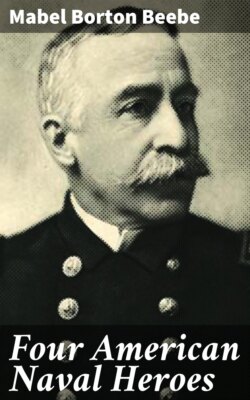Читать книгу Four American Naval Heroes - Mabel Borton Beebe - Страница 9
IV.—Lieutenant Paul Jones.
ОглавлениеIn the year 1773, soon after the trouble with England had begun, John Paul's brother William died in Virginia. He left some money and his plantation, but had made no will to say who should have them. He had no children, and his wife had been dead for years.
His father had died the year before, and John was the only one of the family now living who could manage the estate.
So he left the sea and went to live on the farm near Fredericksburg, in Virginia. He thought that he would spend the rest of his life in the quiet country, and never return to the sea.
He soon learned to love America very dearly, even more than he did his own country. He wanted to see the colonists win in their struggle for their rights.
But so good a sailor could not be a good farmer. In two years the farm was in a bad condition and all the money left by his brother had been spent. The agents in Scotland, with whom John Paul had left money for the care of his mother and sisters, had proved to be dishonest, and this money also had been lost.
In the midst of these perplexities, he decided to serve America in the war which every one saw was now inevitable.
Another congress of delegates from the colonies met in 1775, and made preparations for that war. The colonists were organized into an army, with George Washington as the commander in chief.
A fleet of English vessels had been sent across the Atlantic. The swiftest of these sailed up and down the Atlantic coast, forcing the people in the towns to give provisions to the king's sailors and soldiers. Other vessels were constantly coming over, loaded with arms and ammunition for the English soldiers.
George Washington's army was almost without ammunition. There was very little gunpowder made in this country at that time, and the need of it was very great.
JOHN ADAMS.
It was thought that the best way to supply the American army with ammunition was to capture the English vessels. It was for this purpose that the first American navy was organized.
The first navy yard was established at Plymouth. Here a few schooners and merchant vessels were equipped with cannon as warships. These were manned by bold, brave men, who, since boyhood, had been on the sea in fishing or trading vessels.
No member of the Continental Congress did more to strengthen and enlarge this first navy than John Adams.
In 1775 John Paul settled up his affairs, left the Virginia farm, and went to Philadelphia to offer his services to the naval committee of Congress.
He gave his name as John Paul Jones. Just why he did this, we do not know. Perhaps he did not wish his friends in Scotland to know that he had taken up arms against his native country.
Perhaps he thought that, should he ever be captured by the English, it would go harder with him if they should know his English name. We cannot tell. Hereafter we shall call him Paul Jones, as this is the name by which he was known during the rest of his life.
Congress accepted his offer and he was made first lieutenant on the Alfred, a flag-ship.
